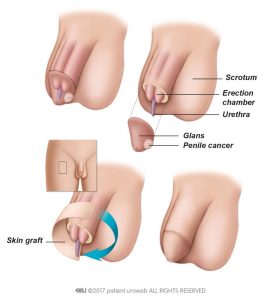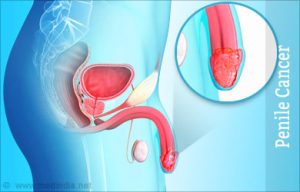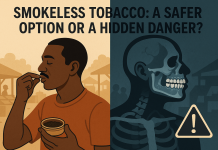Cancer of penis or penile cancer is a rare cancer type that occurs within the penis or on the skin of the penis. It is commonly known to affect men who are above 60 years. In the past 30 years, the number of penile cancer cases has increased by over 20%. This has been attributed to changes in sexual practices.
Signs and symptoms
What should you look out for?
- A sore or a growth on the penis that has refused to heal after about four weeks
- A discharge that comes with a foul smell
- A rash on the penis
- Change in the colour of the foreskin or skin of the penis
If you discover you are experiencing these symptoms, your best bet is to visit a doctor immediately. In the end, it might not even be as a result of cancer of the penis but then, they need to be checked. Early detection is always key to a successful treatment.

Risk factors
What causes cancer of the penis is unknown but there are certain risk factors that can increase the chances of you getting it.
- Men who are carriers of human papilloma virus (HPV) are more likely to develop this cancer. HPV is responsible for genital warts
- Age is another factor that poses the risk of having penile cancer. It rarely affects men who are below age 40 but it’s common in men above 60
- Smoking, as chemicals present in cigarettes, can destroy cells in the penis
- Repeated infections have also been linked to increased risk of penile cancer because they weaken the immune system.
Treating cancer of the penis
This depends on the size of the area affected and how fast the cancer is spreading.
The main forms of treatment when the cancer is not at a very stage are:
- Radiotherapy
- Chemotherapy
- Surgery
During surgery, cancerous cells and possibly some surrounding tissue would be removed. Not to worry, reconstructive surgery can be used to correct any physical changes made to your penis after the operation. A functioning penis can be recreated by taking skin and muscle from elsewhere.

Prevention
One can’t really prevent penile cancer but the chances of getting it can be reduced.
Giving up smoking is one of the main ways to reduce one’s chances of getting penile cancer. Also, maintaining good penis hygiene in order to prevent viral and bacterial infections.
Simple penis hygiene tactics include:
- Regular washing of the penis with warm water including the foreskin
- Using condoms to reduce the chances of catching HPV









